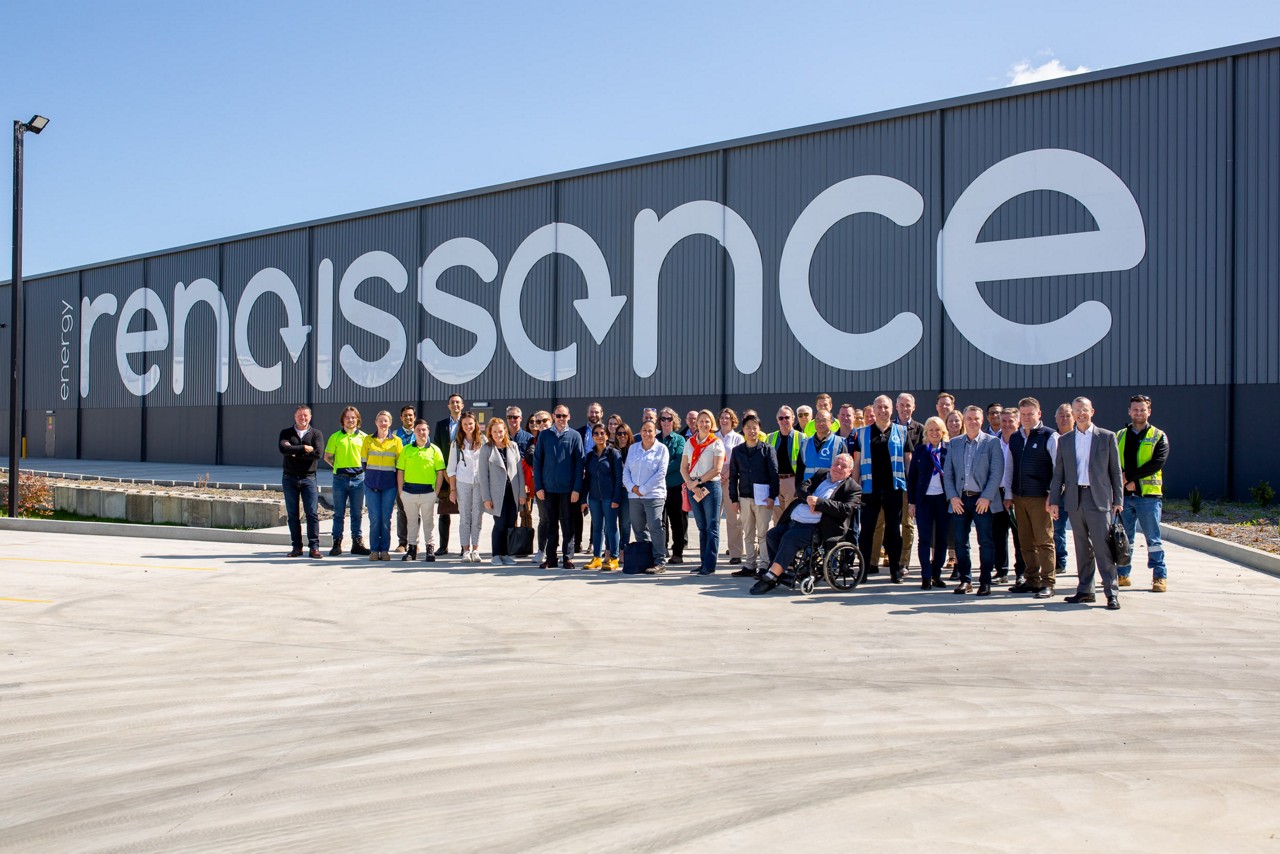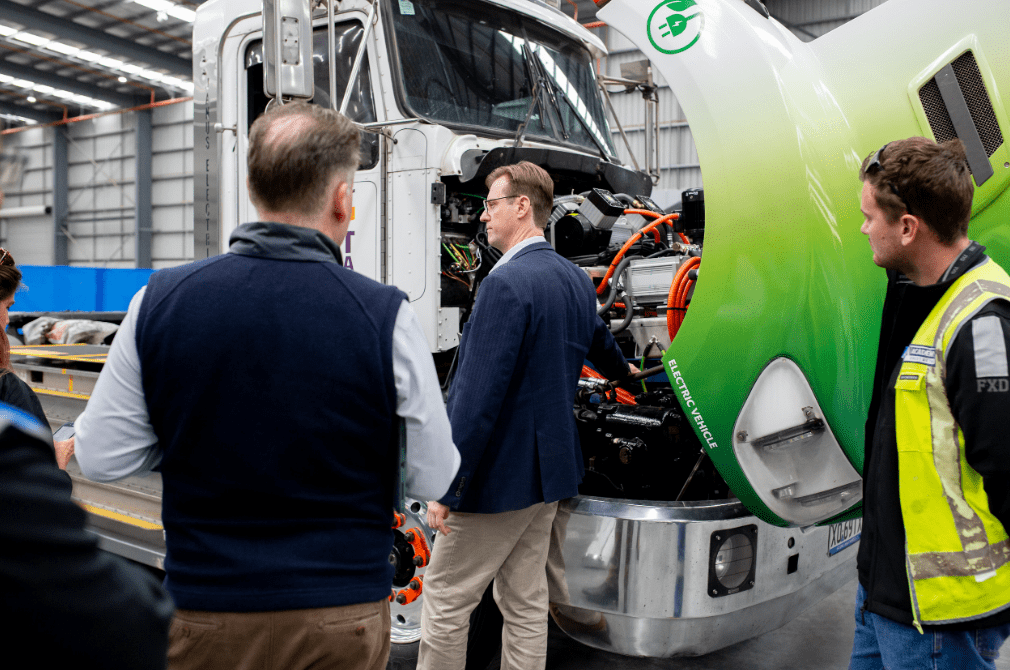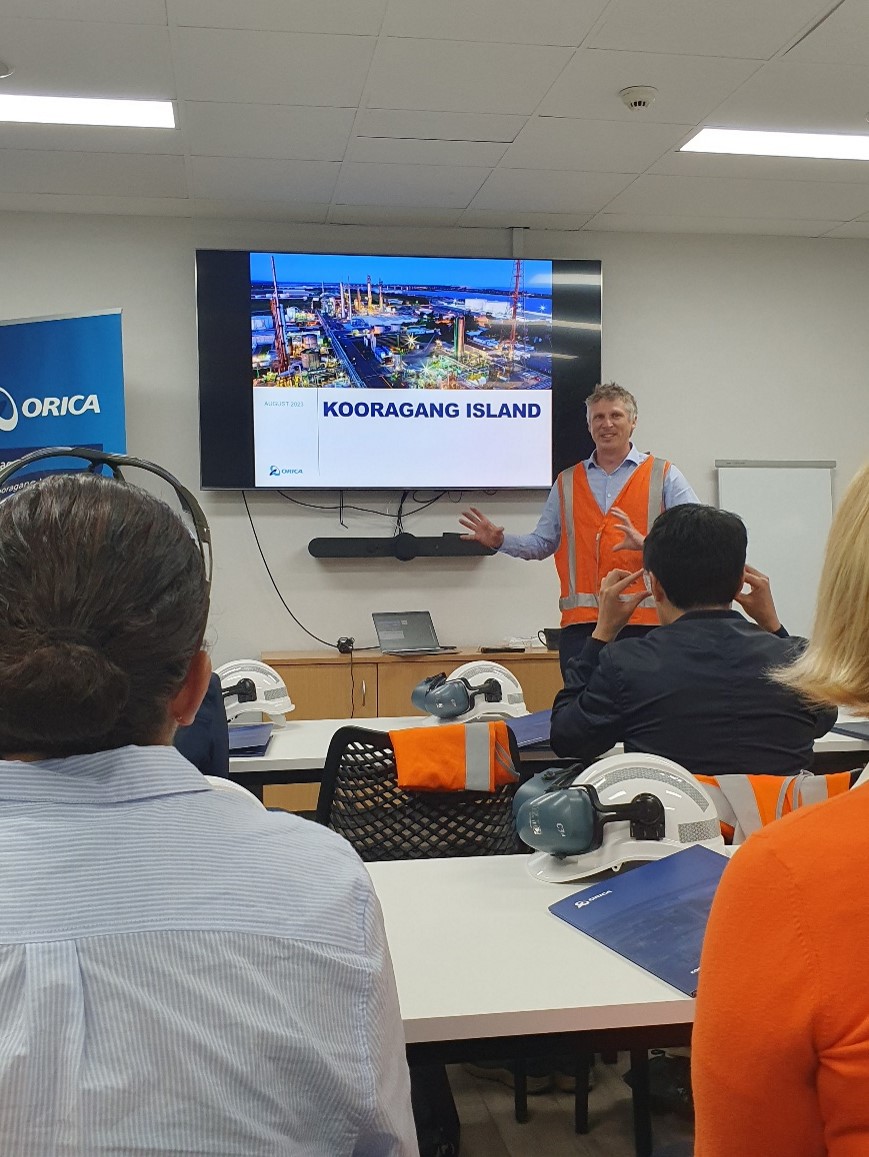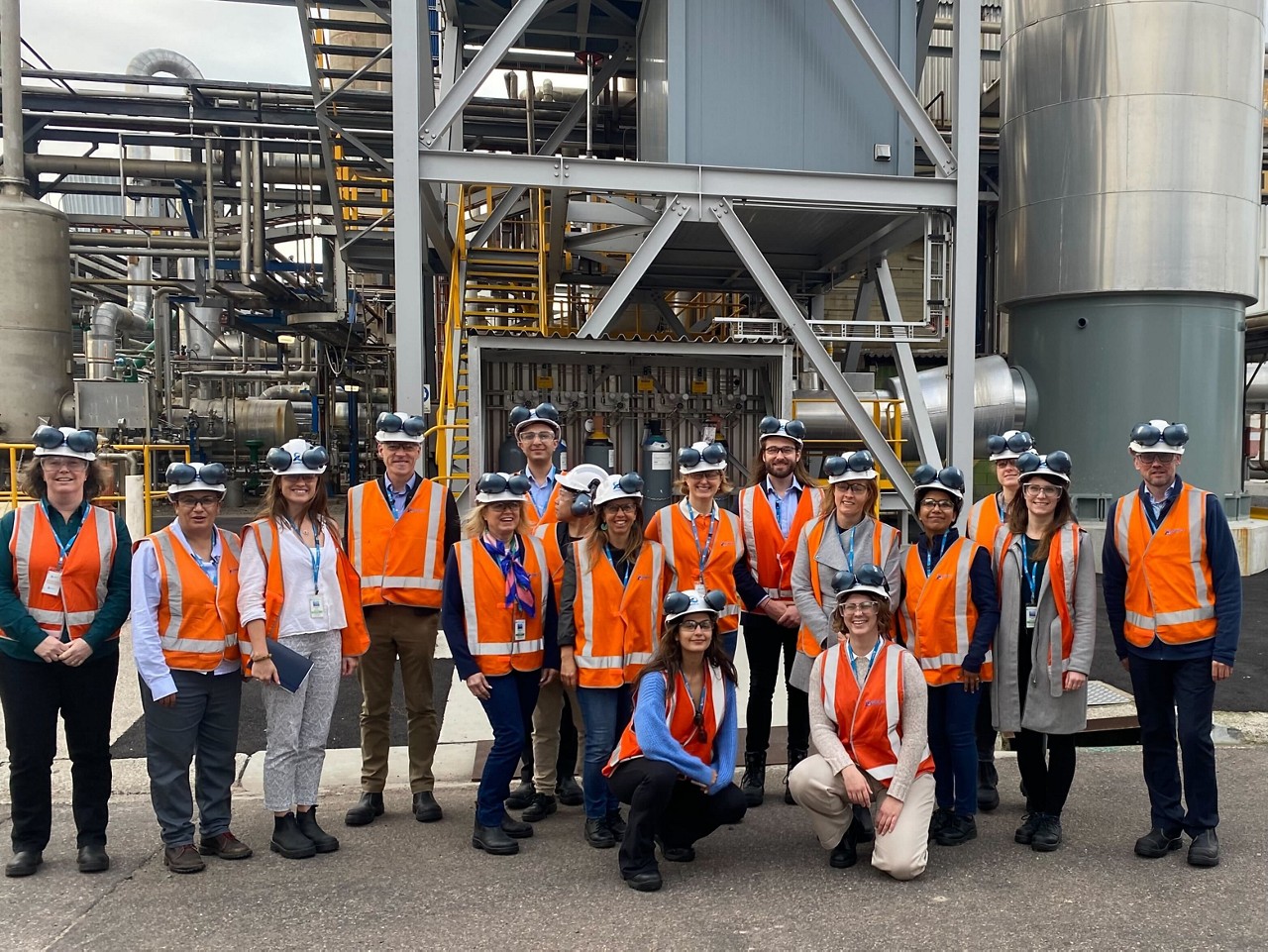The push for achieving a decarbonised economy will see sweeping social and economic change across regional communities in Australia. The new frontier in the march for a greener future in Australia is a focus on a just transition, supported by a Federal Government-backed Net Zero Authority, to ensure workers, industries and communities can seize opportunities in the nation’s net zero transformation.
The Hunter region, north of Sydney, is one such region that is facing significant structural economic changes due to a shift away from fossil-fuel driven energy towards renewable energy sources. This creates both challenges and opportunities for the future. The region has traditionally been very dependent on coal mining and coal-fired energy generation and is home to skilled workers, local suppliers, and has modern infrastructure such as industry sites, ports and railway.
In a recent visit, organised by the Investor Group on Climate Change (IGCC), representatives from superannuation funds and investment managers had the opportunity to be at the coalface to hear first-hand how the net zero transition is taking place across the region. Bjorn De Smedt, a Responsible Investment Specialist at First Sentier Investors, shares his observations from the visit.
Stakeholder engagement: A focus for unions in Newcastle
We heard from unions and the Hunter Job Alliance of the increasing need for coordinated and proactive action, policies and programs, as well as genuine community engagement to ensure a fair and inclusive future for a workforce that has powered Australia for generations. This includes retraining the workforce, providing career advice for youth, attracting investor capital and government coordination to support companies to engage with net zero transformation opportunities.
The discussion included a nod to environmental impacts, including to local biodiversity and there was debate around the rehabilitation of the region’s native bushland versus conversion of industrial sites into new industrial sites, or grazing land.
The Net Zero Authority will need to play a significant role in coordinating a just transition, including to bring all stakeholders together to identify net zero transformation opportunities, attract new business through the creation of government funds and grants linked to local job creation, training and education to upskill workers, and importantly to creating sound frameworks for a just transition.
Although there is a lot of focus on worker transition, there are still gaps in considering the environment and the community. Workers and local communities are cognisant of the transition towards a decarbonised economy, but many feel they have had little say in the discussion; there is a general sense of fear that there will be a disparity in opportunities for communities in the Lower Hunter versus the Upper Hunter.
Site visit: Energy Renaissance powering a renewable future and a just transition
Energy Renaissance is a Hunter-based lithium-ion battery producer. Its batteries are able to tolerate the high temperatures of the Australian climate and were developed in collaboration with CSIRO to ensure cybersecurity. With the focus on the production of 100% Australian-made batteries, Energy Renaissance ensures there is no reliance on overseas supply chains and they fully control the technology and can safeguard the security of the software managing the batteries.
During the visit, Energy Renaissance presented various applications that currently rely on the batteries: heavy-duty transport’s conversion of second-hand fossil fuel driven trucks into battery-powered trucks, city buses driven by battery, and silent cyber-secure batteries developed for defence in Australia. Representatives from the businesses applying these batteries also explained how they have integrated this technology into their products as a greener option.
The business is also supporting a just transition by offering employment opportunities to local, skilled workers who previously worked in high carbon intensive industries.


Site visit: Orica’s shift to renewables
Orica’s Kooragang Island facilities include an ammonia plant, three nitric acid and two ammonium nitrate plants. The ammonia plant is the largest consumer of natural gas (approx. 15% of NSW gas needs) and produces approximately 385,000 tonnes of ammonia per annum, which is used to produce nitric acid and ammonium nitrate. The latter solely produced for the manufacture of explosives for the mining industry, conveniently located further up in the Hunter. Other applications are fertilisers and refrigerants.
This visit was a practical example of how an energy-intensive chemical company is tackling the transition to a low carbon world. Where production outputs mainly served a mining industry that is shifting away from coal to metals and minerals mining, as part of the ambition to achieve net zero emissions by 2050, the focus is now on renewable energy use, energy optimisation and alternative fuels such as hydrogen. Key initiatives include:
- Secondary and tertiary abatement of nitrous oxide in the nitric acid plants
- Reducing operational GHG emissions by 40% by 2030, from 2019 levels
- Moving from natural gas to 100% renewable electricity by 2040, with an interim target of 60% by 2030
- Support the Hunter Valley Hydrogen Hub (HVHH) to produce green hydrogen and carbon capture utilisation (CCU) through the MCi pilot plant
- Utilising almost 100% of reusable water


Roundtable discussion on the implications of a just transition at the University of Newcastle
Recent interview-based research commissioned by IGCC suggests that the needs, constraints, and mandates of investors, governments, and businesses in transitioning regions are not yet converging to enable investment at the magnitude or speed required to implement a just transition for affected workers and communities, while securing Australia’s competitive advantage in the global net zero economy.
These implications were apparent in a roundtable discussion with investors and representatives from Orica, Port of Newcastle and Energy Renaissance. The discussion centred on the role of local governments to support the industry’s transition, highlighting the urgent need for investment and the associated challenges in the risk appetite and return thresholds of different types of investors, and the range of investment criteria that applies to different asset classes.
Local governments can utilise a range of tools to promote economic development and attract private sector investment in regional areas, including grants, loans, tax incentives, and direct equity investments. They also play an important and influential role in ensuring all stakeholders have the opportunity to participate in the development of a long-term vision for their region, whether in the Hunter Valley or elsewhere. The Net Zero Authority and regional transition authorities should provide a “front door” for industry and investors involved in the energy transition. A centralised and properly resourced Authority would help to:
- Prevent duplication and siloed work between local, state and federal and within governments
- Enhance the flow of communication and stakeholders’ access to resources including to support discussions on issues of access to buffer land and site rehabilitation/conversion
- Facilitate useful connections between relevant stakeholders – while local governments are keen to assist investors, more support it required to understand what investors might be looking for
Progress in the right direction
The opportunity to be at the coalface of the Hunter region’s push for a decarbonised economy has highlighted the promising progress that many organisations have made towards this goal. However, it is also clear that more can be done to underpin a just transition.
Local governments, organisations and investors will need to be mindful of the acute social changes that will accompany the economic impacts of net zero, ensuring the transition is fair and inclusive for all affected stakeholders. While the Net Zero Authority will steer the Government’s agenda to support workers, communities and industries, it will be important for companies and investors to work collaboratively and listen to the needs of those workers and communities on the ground.
Important Information
This material is for general information purposes only. It does not constitute investment or financial advice and does not take into account any specific investment objectives, financial situation or needs. This is not an offer to provide asset management services, is not a recommendation or an offer or solicitation to buy, hold or sell any security or to execute any agreement for portfolio management or investment advisory services and this material has not been prepared in connection with any such offer. Before making any investment decision you should consider, with the assistance of a financial advisor, your individual investment needs, objectives and financial situation.
We have taken reasonable care to ensure that this material is accurate, current, and complete and fit for its intended purpose and audience as at the date of publication. No assurance is given or liability accepted regarding the accuracy, validity or completeness of this material and we do not undertake to update it in future if circumstances change.
To the extent this material contains any expression of opinion or forward-looking statements, such opinions and statements are based on assumptions, matters and sources believed to be true and reliable at the time of publication only. This material reflects the views of the individual writers only. Those views may change, may not prove to be valid and may not reflect the views of everyone at First Sentier Investors.
Get the right experience for you
Your location :  Australia
Australia
Australia & NZ
-
 Australia
Australia -
 New Zealand
New Zealand
Asia
-
 Hong Kong (English)
Hong Kong (English) -
 Hong Kong (Chinese)
Hong Kong (Chinese) -
 Singapore
Singapore -
 Japan
Japan

















 United Kingdom
United Kingdom 